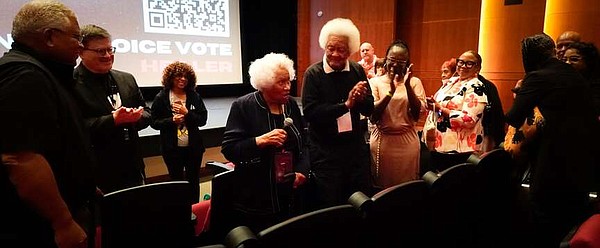Film festivals are weird. Last year there were over a dozen in Arkansas alone.
That means I sit in a dark theater, sometimes crowded, sometimes alone, watching the same short film over and over again. Sometimes it's a bit redundant and boring. But when the festival is run properly, there's an intangible spark of magic in the air. When the festival comes to life, energized, when every single person in the audience melts together to form a community, when the midnight air is calm and still, full of surprise and danger, the world becomes surreal.
That's how I would describe last weekend's Made in Arkansas Film Festival, the second film festival that has both entertained and threatened my life at the same time.
I was a little nervous about going to the festival on opening day, May 17th. The last few film events I've attended haven't drawn large crowds, and part of me felt like the festival was slowly dying out. But to my surprise, the parking lot at the Ron Robinson Theater was full. It was so crowded that I had to go to a parking garage, which ended up costing me $12 for the night. Money well spent, as I slowly made my way through the theater's crowded lobby and found my seat in the far corner of the screening room.
While student films are a mainstay of these festivals, this year there were several films directed and produced by University of Central Arkansas professors, including Chris Churchill's short “Smoothie” (which ultimately won the award for Best Short Film) and “Mountain Flowers,” a feature film directed by UCA film production professor Bruce Hutchinson.
“Mountain Flowers” is a unique film that is a perfect representative of slow cinema. In fact, some might call it the slowest film ever made. The opening shot alone is 10 minutes long. Most shots in the film linger, challenging and encouraging the audience to continue watching the film until the end. The plot is very minimalist, with two women spending a day together, trying to navigate the logistics and emotional impact of a long-distance relationship.
As straightforward as the story is, it's the style of the film that really shines, showcasing Hutchinson's lifelong study of film. Scenes in the film borrow visual cues from great directors like Andrei Tarkovsky, Yasujiro Ozu, Chantal Akerman and David Lynch. Mountain Flowers sculpts time, making the viewer feel the passage of time and the subtle relationships between each moment.
The festival kicked off Saturday morning with some fantastic documentaries that ranged from inspiring to chilling. Crime fans will love “Uneven Ground: The Melissa Witt Story,” a haunting film that focuses on the unsolved 1994 murder of Melissa Witt, who was kidnapped in the parking lot of a bowling alley in Fort Smith. On the other end of the spectrum is the inspiring documentary “Healer: The Dr. Joycelyn Elders Story.”
The documentary charts Elders' life from sharecropper's daughter to the first Black Surgeon General of the United States. What made the screening even more special was that Elders, 90, was in attendance herself: Instead of the usual Q&A, the festival handed Elders the microphone for an impassioned speech that brought tears to the eyes of everyone in the audience.
Then something strange started to happen. There was a kind of static in the air, and the hairs on my arms stood on end. The festival started to feel special. For the first time in a long time, it felt like the old, magical, now mythical days of the Little Rock Film Festival. It felt like the void left by LRFF was starting to fill again.
For the last few blocks on Saturday, the theater was packed with filmmakers and moviegoers, all laughing in unison during the comedy block, all gasping in unison during the horror block, and all scratching their heads in confusion during the “WTF” block.
These blocks featured an impressive selection of films, including Claire Moon's House of Leaves-inspired short I Went Home for Valentine's, which depicts a never-ending staircase to an abyss; and two promising feature films: The Tickle Monster, about a young boy who accidentally unleashes a monster that tickles him to death; a homage to the 1990s VHS horror genre that has great potential; and Peeping Todd, a musical thriller about a peeping Tom; a feature version of the short is currently in production.
All of the films screened on Saturday night received a tremendous response from the audience, as the packed theater responded in unison with laughter, smiles and joy, certainly creating an atmosphere of movie magic.
Long after the final credits rolled, the evening became surreal. The audience thinned out into the night. I lingered with the three other filmmakers (Jordan Mears, Paula Blanco Pérez, and Lexi Mosby), discussing food allergies, chaotic sets, and even contemplating selling our organs on the black market to fund our next film. Suddenly, four loud bangs rang out from the River Market. The next thing we saw was a horde of people running down the alleys surrounding the theater. They were yelling, “There's a shooting in the park!”
It took me a few beats to process this information, and then, like a coward in the middle of the night, I decided to rush back to my car. Mears was at least prepared to walk the other two filmmakers halfway to their car, and learning that Paula and Lexie had rescued two abandoned teenagers from the crowd and brought them safely home made them the heroes of the night, while I felt like a despicable person.
That brief, near-fatal encounter aside, Made in Arkansas was one of the best weekends of any film festival in recent memory. Now in its sixth year, it feels like the festival is finally poised to take the spot the Little Rock Film Festival left behind almost a decade ago. Maybe the void in Arkansas cinema is slowly getting smaller.



